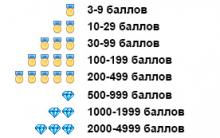Essays for option No. 15 of the OGE in the Russian language "36 options. I.P. Tsybulko".
Text
Maria Naryshkina comes from a remote, sandy town in the Astrakhan province. From childhood, Maria saw the sandy steppes of the Caspian region rippling from the lightest wind, caravans of camels leaving for Persia, tanned merchants hoarse from sand powder, and at home, in an enthusiastic frenzy, she read her father's geographical books. The desert was her home, and geography was her poetry.


Essay 9.1
Write an essay-reasoning, revealing the meaning of the statement of the famous linguist Dmitry Nikolayevich Shmelev: "The figurative meaning of the word enriches our language, develops and transforms it."
The famous linguist Dmitry Nikolaevich Shmelev wrote: "The figurative meaning of the word enriches our language, develops and transforms it." And, of course, you can't argue with that, because language tools, which are based on a figurative meaning, really give us unlimited opportunities for non-standard and subjective reflection of our thoughts. Let's prove it on the example of Andrey Platonov's text.
Especially well, in my opinion, the words “art” and “live” are used in sentence 13: “... at school, the main subject of training in the fight against sand should be made, teaching the art of turning the desert into living land.” The writer's thought, thanks to the mentioned words, sparkled with new meanings: they looked at a difficult matter in a new way, as something interesting and not so difficult, a noble and lofty goal appeared - to make the dead alive.
“The desert gradually turned green and became friendlier,” we read in sentence 26. The figurative meaning of the word “friendly” helps us understand how it is steadily changing towards better life in a once sandy village.
Andrei Platonov used words in a figurative sense to express his thoughts in the way that he alone can: deeply, subtly, non-standard. And we can safely say that by doing this the writer "developed and transformed our language."
Essay 9.2
Write an essay-reasoning. Explain how you understand the meaning of the final text: “You, Maria Nikiforovna, could manage a whole people, not a school. The desert is the future world, and people will be grateful when a tree grows in the desert ... "
The final text of Andrey Platonov reflects the main idea, which can be formulated as follows: the heroine of the work performs a real feat on a national scale, helping people to develop the desert, making it suitable for normal life - turning it into a garden. It is impossible not to admire this woman.
First, she is able to think about people. Maria Nikiforovna cannot calmly observe "silent poverty and humble despair." Sympathy and the desire to help - that was the motive for all her future activities.
Secondly, this woman is a real scientist. She got down to business, armed with special literature: "... the teacher was given books and advised to teach the sand business herself." Knowledge is power, and you can't argue with that.
Thirdly, Maria Nikiforovna is an excellent organizer, as she managed to organize the work of transforming the desert: “With great
with labor ... Maria Nikiforovna managed to convince the peasants to organize voluntary public works every year ... ".
Thus, we are convinced that this heroic woman really accomplishes a feat of a national scale, she is worthy of admiration for her indifferent attitude towards people, her education and leadership qualities.
Essay 9.3
How do you understand the meaning of the word PURPOSE? Formulate and comment on your definition. Write an essay-reasoning on the topic "How can a person's purposefulness affect the world around him?"
Purposefulness is the main quality that is needed to accomplish great things. It manifests itself in the fact that a person builds a system of actions and begins to embody the planned life step by step. So it was in the story of Andrei Platonov.
The main character of this work is Maria Nikiforovna, who set herself the goal of turning the desert into a “living land”. Her first step was to read books on fighting the sands. Then she began to work with the villagers: she convinced the peasants to organize voluntary public works. Then she turned the school into a center for the dissemination of wisdom "to live in the sandy steppe." And the goal was achieved - Khoshutovo was transformed.
Purposefulness drives many great people. For example, the life of Mikhail Vasilyevich Lomonosov from early childhood was subordinated to the knowledge of the world. In order to become a scientist, he came to Moscow on foot, miraculously entered the Slavic-Greek-Latin Academy. It was difficult for him, at the age of eighteen, to sit with the boys in the same class, to endure ridicule and suffer from a lack of funds, from the absence of the most necessary things. But Lomonosov was distinguished by his extraordinary perseverance and an unprecedented thirst for knowledge. And the goal was achieved - Lomonosov became the first Russian professor and founded a university named after him. We can say that all our science owes its development to this man. Mikhail Vasilievich's whole life was devoted to science, and his determination helped him overcome all difficulties and obstacles.
We owe all the best in our world to purposeful people who are able to devote their whole lives to the realization of a great goal.
15.1 Write an essay-reasoning, revealing the meaning of the statement of the famous linguist Dmitry Nikolaevich Shmelev: "The figurative meaning of the word enriches our language, develops and transforms it."
In the Russian language, along with single-valued words, there are a huge number of such words that have not one, but two or more meanings. If you look in the Explanatory Dictionary, you can see that there are even more such words than unambiguous ones. Of course, this is no coincidence. Polysemantic words give expressiveness to speech. On use different values one ambiguous word is based on such a joke as a pun; the figurative meaning of the word allows you to make your statement brighter.
For example, in the text of L. Panteleev in sentence 11 we read about how a pile of cakes “melted”. This word is used in a figurative sense of “decreased in size”, and we can easily imagine this picture: a bunch of cakes are getting smaller, and then they completely disappear.
In sentence 20, the author writes about the boy that his lips “jumped”. This is also a word in a figurative sense. Reading, we immediately understand that the newcomer is almost crying from anger and resentment, to such an extent he is shocked by the act of the guys.
Words in a figurative sense are often used in fiction as a means of expression.
15.2 Write an essay-reasoning. Explain how you understand the meaning of sentences 47-49 of the text: “-You know, Lyonka, you are doing well,” said the Japanese, blushing and sniffing. - Forgive us, please. This is not only for myself, I speak for the whole class.
The action of the book "Republic of SHKID" takes place in a colony. The guys who got there are, of course, not angels. Most of them stole on the street so as not to starve to death, and some of their habits remained at that moment, which is described in the episode with the stolen cakes.
But the newcomer Panteleev was more honest than the others: it seemed dishonorable to him to steal from a blind old woman, so the other colonists beat him, and the director, without understanding, punished Panteleev, because he did not deny his guilt.
The other colonists felt ashamed. That is why the Japanese blushed when he asked for forgiveness from Lyonka. The guys suddenly realized that it is possible to live more honestly than they do: not to offend the weak, not to shift the blame onto others. This is stated in the words of the Japanese (in sentences 40 - 42). But going to the director and confessing is still too heroic an act for guys who are not used to living honestly. As a result, no one supports the proposal of the Japanese, but still the guys felt guilty and agreed with the apologies. Therefore, Lenka reconciled with the guys (sentence 51-52).
15.3 How do you understand the meaning of the word CONSCIENCE?
Conscience is what allows a person to be a person, such a feeling of the rightness or wrongness of an act, a kind of compass. Anyone who has a conscience understands how to act and how not, and he tries to avoid bad deeds even if no one knows for sure about them.
Conscience helps us evaluate ourselves. Unfortunately, not everyone has a conscience. Some believe that there are only problems from her: she reproaches, does not give rest, but a person strives for happiness and peace. And it also happens that someone's conscience has not yet been properly formed. For example, in this text we just see guys who did not listen to their conscience, because it rather interfered with them when they lived on the street and were forced to steal and deceive so as not to die of hunger. But Lyonka's honest act first shocked them and caused aggression, and then made them wake up better feelings. They felt ashamed, which means that they became a little better than they were before.
Conscience makes a person ashamed of others if they do something bad. I met such an example in literature - in the story of E. Nosov "Doll". The hero of this story, Akimych, is ashamed of those people who pass by a mutilated doll and do not pay attention to this disgrace. He buries the doll and says: "You can't bury everything." I think he means that unscrupulous people with the silent connivance of the rest have already committed a lot of evil, it is already difficult to correct it. The author encourages those in whom the conscience is still alive, not to get used to the bad, but to try to correct it.
Conscience is the core of the human soul.
Among the variety of means of artistic expression of the Russian language, the figurative meaning of the word occupies a special place. Such words help to express thoughts more accurately, make speech brighter and more emotional.
In the text of L. Panteleev there is a phrase that conveys the words of one of the heroes of the Japanese story: “After all, guys, this is rudeness,” the Japanese fumed. The author uses the verb "boiled" in a figurative sense, so that readers feel how outraged the hero is, eager to restore justice. In sentence 11 we meet with the verb "melted". The figurative meaning of the word helps to understand how quickly the cakes disappeared from the old woman's dish.
In addition, the effect of using a figurative meaning is used to create various tropes. With the help of them, metaphors are formed, epithets arise. L. Panteleev's text tells how the school director reacted to the beating of a student by his comrades. He calls it a "wild" way of outrage. The epithet "wild" conveys the negative attitude of the teacher to the fight.
From all that has been said, we can conclude that the statement of Dmitry Nikolaevich Shmelev is true. "The figurative meaning of the word enriches our language, develops and transforms it."
Words, phrases, phrases and sentences - all this and much more is embedded in the concept of "language". How much is hidden in it, and how little we really know about the language! Every day and even every minute we spend next to him - whether we say our thoughts aloud or we read or listen to the radio ... Language, our speech is a real art, and it should be beautiful. And its beauty must be genuine. What helps in the search for true beauty
The direct and figurative meaning of words is what enriches our language, develops it and transforms it. How does this happen? Let's understand this endless process, when, as they say, words grow from words.
First of all, you should understand the figurative meaning of the word, and what main types they are divided into. Each word can have one or more whole line values. Words with the same meaning are called monosemantic words. In Russian, there are much fewer of them than words with many different meanings. Examples are words such as computer, ash, satin, sleeve. A word that can be used in several meanings, including figuratively, is a polysemantic word, examples: a house can be used in the meaning of a building, a place for people to live, a family way of life, etc.; the sky is the air space above the earth, as well as the location of the visible luminaries, or divine power, conduction.
With ambiguity, a direct and figurative meaning of a word is distinguished. The first meaning of the word, its basis - this is the direct meaning of the word. By the way, the word “direct” in this context is figurative, i.e. the main meaning of the word is “something even,

without bends” - is transferred to another object or phenomenon with the meaning “literal, unambiguously expressed”. So there is no need to go far - you just need to be more attentive and observant in what words we use, when and how.
From the above example, it already becomes clear that the figurative meaning is the secondary meaning of the word that arose when the literal meaning of the word was transferred to another object. Depending on what feature of the object was the reason for the transfer of meaning, there are such types of figurative meaning as metonymy, metaphor, synecdoche.
Direct and can overlap with each other based on similarity - this is a metaphor. For instance:
ice water - ice hands(by sign);
poisonous mushroom - poisonous character (by sign);
a star in the sky - a star in the hand (according to the location);
chocolate candy - chocolate tan (based on color).

Metonymy is the selection in a phenomenon or object of some property, which, by its nature, can replace the rest. For instance:
gold jewelry - she has gold in her ears;
porcelain dishes - there was porcelain on the shelves;
headache - my head is gone.
And, finally, synecdoche is a type of metonymy when one word is replaced by another on the basis of a constant, really existing ratio of part to whole and vice versa. For instance:
He is a real head (meaning very smart, the head is the part of the body that houses the brain).
The whole village sided with him - every resident, that is, the "village" as a whole, which replaces its part.
What can be said in conclusion? Only one thing: if you know the direct and figurative meaning of a word, you will not only be able to use certain words correctly, but also enrich your speech, and learn how to convey your thoughts and feelings beautifully, and maybe one day you will come up with your own metaphor or metonymy ... Who knows?
Direct and figurative meaning of the word
Every word has a base lexical meaning.
For instance, desk- it school table, green- color of grass or foliage, there is- it means to eat.
The meaning of the word is called direct if the sound of a word accurately indicates an object, action or sign.
Sometimes the sound of one word is transferred to another object, action or feature based on similarity. The word has a new lexical meaning, which is called portable .
Consider examples of direct and figurative meanings of words. If a person says a word sea, he and his interlocutors have an image of a large body of water with salt water.
Rice. 1. Black Sea ()
This is the direct meaning of the word sea. And in combinations sea of lights, sea of people, sea of books we see the figurative meaning of the word sea, which stands for a large number of something or someone.

Rice. 2. City lights ()
Gold coins, earrings, goblet are items made of gold.
This is the direct meaning of the word gold. The phrases have a figurative meaning: goldenhair- hair with a brilliant yellow tint, skillful fingers- so they say about the ability to do something well, goldenheart- so they say about a person who does good.
Word heavy has a direct meaning - to have a significant mass. For instance, heavy load, box, briefcase.

Rice. 6. Heavy load ()
The following phrases have a figurative meaning: heavy task- complex, which is not easy to solve; tough day- a hard day that requires effort; hard look- gloomy, severe.
girl jumping and temperature fluctuates.
In the first case - direct value, in the second - figurative (rapid change in temperature).
boy running- direct meaning. Time is running out- portable.
Frost bound the river- figurative meaning - means that the water in the river is frozen.

Rice. 11. River in winter ()
House wall- direct meaning. O heavy rain you can say: rain wall. This is a portable meaning.
Read the poem:
What is that wonder?
The sun is shining, the rain is falling
By the river is big beautiful
The rainbow bridge rises.
If the sun shines bright
The rain is pouring mischievously,
So this rain, children,
called mushroom!
Mushroom rain- figurative meaning.
As we already know, words with multiple meanings are polysemantic.
A figurative meaning is one of the meanings of a polysemantic word.
It is possible to determine in what meaning a word is used only from the context, i.e. in a sentence. For instance:
Candles were burning on the table. direct meaning.
His eyes burned with happiness. Figurative meaning.
You can turn to the explanatory dictionary for help. The first is always given the direct meaning of the word, and then the figurative.
Consider an example.
Cold -
1. having a low temperature. Wash the hands cold water. A cold wind was blowing from the north.
2. Translated. About clothes. Cold coat.
3. Translated. About color. Cold shades of the picture.
4. Translated. About emotions. Cold view. Cold meeting.
Consolidation of knowledge in practice
Let's determine which of the highlighted words are used in a direct and which in a figurative sense.
At the table, the mother said:
- Enough chatting.
And son carefully:
- A dangle your feet can?

Rice. 16. Mom and son ()
Let's check: babble- figurative meaning; dangle your feet- direct.
Flocks of birds fly away
Away, beyond the blue sea,
All the trees are shining
in multicolored attire.

Rice. 17. Birds in autumn ()
Let's check: blue ocean- direct meaning; multi-colored tree decoration- portable.
The breeze asked as it flew by:
- Why are you rye, golden?
And in response, the spikelets rustle:
- Golden US arms are growing.

Let's check: golden rye- figurative meaning; golden hands- figurative meaning.
Let's write down the phrases and determine whether they are used in a direct or figurative sense.
Clean hands, an iron nail, a heavy suitcase, a wolfish appetite, a heavy character, Olympian calmness, iron hand, golden ring, golden man, wolf skin.
Let's check: clean hands - direct, iron nail- direct, heavy bag- direct, wolfish appetite- portable, heavy character- portable, Olympian calm- portable, iron hand- portable, Golden ring- direct, Golden man- portable, wolf skin- direct.
Let's make phrases, write down phrases in a figurative sense.
Evil (frost, wolf), black (paints, thoughts), runs (athlete, stream), hat (mother's, snow), tail (foxes, trains), hit (frost, with a hammer), drumming (rain, musician).
Let's check: an evil frost, black thoughts, a stream runs, a cap of snow, a tail of a train, frost hit, rain drums.
In this lesson, we learned that words have a direct and figurative meaning. The figurative meaning makes our speech figurative, vivid. Therefore, writers and poets are very fond of using figurative meaning in their works.
In the next lesson, we will learn what part of the word is called the root, learn how to highlight it in the word, talk about the meaning and functions of this part of the word.
- Klimanova L.F., Babushkina T.V. Russian language. 2. - M.: Enlightenment, 2012 (http://www.twirpx.com/file/1153023/)
- Buneev R.N., Buneeva E.V., Pronina O.V. Russian language. 2. - M.: Balass.
- Ramzaeva T.G. Russian language. 2. - M.: Bustard.
- Openclass.ru ().
- The festival pedagogical ideas"Public lesson" ().
- sch15-apatity.ucoz.ru ().
- Klimanova L.F., Babushkina T.V. Russian language. 2. - M.: Enlightenment, 2012. Part 2. Do ex. 28 p. 21.
- Choose the correct answer to the following questions:
1. The vocabulary of the language is studied by science:
A) phonetics
B) syntax
C) lexicology
2. The word is used in a figurative sense in both phrases:
A) stone heart, build a bridge
B) the heat of the sun, stone edition
C) golden words, make plans
3. In which row are the words polysemantic:
A) star, artificial, stone
B) single, blinds, jockey
C) rocky, caftan, composer
- * Using the knowledge gained in the lesson, come up with 4-6 sentences with words field and give, where these words are used in direct and figurative meanings.











Promotional codes e-delivery for September E-delivery promotion
Codes for the game dungeon hunter 5
Indian castes: what is it?
The lost memoirs of Faina Ranevskaya Faina became friends with Ekaterina Geltser immediately
Life schedule by date of birth Who will I be in my future life